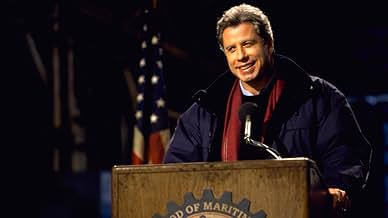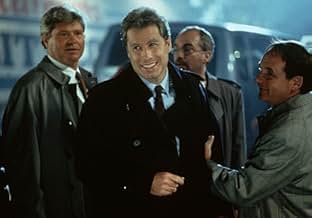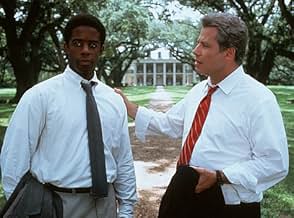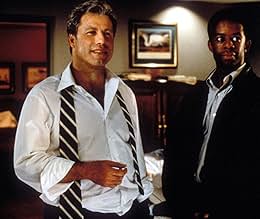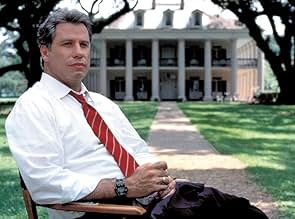Primary Colors
- 1998
- Tous publics
- 2h 23min
Politicien ambitieux, Stanton s'entoure d'une équipe dévouée pour les présidentielles : Henry, un jeune noir sincère et brillant ; Richard un conseiller intraitable ; son épouse Susan, prête... Tout lirePoliticien ambitieux, Stanton s'entoure d'une équipe dévouée pour les présidentielles : Henry, un jeune noir sincère et brillant ; Richard un conseiller intraitable ; son épouse Susan, prête à sacrifier jusqu'à son honneur pour le servir dans sa carrière. [en 255 car. pour champ ... Tout lirePoliticien ambitieux, Stanton s'entoure d'une équipe dévouée pour les présidentielles : Henry, un jeune noir sincère et brillant ; Richard un conseiller intraitable ; son épouse Susan, prête à sacrifier jusqu'à son honneur pour le servir dans sa carrière. [en 255 car. pour champ texte]
- Réalisation
- Scénario
- Casting principal
- Nommé pour 2 Oscars
- 10 victoires et 31 nominations au total
Avis à la une
This starts off really great, and gets the flavor of a real campaign, without too much Hollywood hype (campaigns have their own kind of falseness, which is played up here). John Travolta not only hits it just right as a feeling and determined candidate, he also nails Bill Clinton pretty well, too. I don't suppose Emma Thompson is supposed to match Hillary quite as well, but she's a perfect running mate, and throw in Billy Bob (Thornton) as a sidekick and you have a really solid working trio.
But it doesn't quite keep the focus or momentum, or honesty, of the opening scenes. Or humor, sometimes. (This is a comedy, by the way, and director Mike Nichols knows comedy, as does his screenwriter and longtime collaborator, Elaine May. They used to do stand up comedy together in the 1950s!)
What begins as a kind of revelation and interior exploration digresses into more and more clichés of what campaigns do, and what they have to do (sleaze wise) to succeed. We know this stuff. It isn't the facts that enchant us, it's the exceptions to the facts, and it's the nuances between them. It never quite flags, though twenty minutes less screen time sounded good by the end. And Travolta and Thompson hold up their roles consistently.
The real saving grace in the second half is the bursting on the scene of Kathy Bates, who is herself at her best. It might be the best Kathy Bates Kathy Bates has ever done, including some impassioned, tearful stuff. The opposing candidate is remarkably convincing--you even want to vote for him--played by Larry Hagman. On the other hand, the young clerk and campaign manager Adrian Lester is a bit too restrained and dull to make him even noticeable.
Nichols is best when he gets two or three or four people interacting as real people, with flaws and intensity and passion (as in "The Graduate" and "Closer"). And those moments here are terrific, and sometimes hilarious, and make the rest easily worthwhile.
Other players in the Clinton drama have their equivalents in the film. The Hillary-figure is Stanton's wife Susan, ever supportive and forgiving in public but in private much less ready to pardon her husband's misdemeanours. Stanton's campaign chief Richard Jemmons is presumably based upon James Carville, who fulfilled the same role for Clinton. Stanton's early rival Lawrence Harris parallels Paul Tsongas, who initially led the race for the Democratic nomination but later faded. There is a Gennifer Flowers (or Paula Jones) equivalent in the shape of Cashmere McCarthy, who claims that she had an affair with Stanton.
Although Stanton is, in one sense, the pivotal character (if he were not running for President there would be no film), in another sense the main character is one of his campaign team, Henry Burton, the grandson of a noted black civil rights activist, as the action is seen though his eyes. Henry is an idealistic young man who is caught in two minds about his boss. On the one hand he admires Stanton for his drive and energy and his sincere determination to improve the lot of ordinary people. On the other hand, he is disillusioned with the corruption involved in politics and with the dirty tricks played both against Stanton and on his behalf. The audience are often in two minds about Stanton as well, as he seems to be a fifty-fifty mixture of sincerity and sleaze.
I have never read the novel (originally credited to "Anonymous", but now known to have been written by Joe Klein) on which the film is based, but from what I have heard Stanton was considerably less sympathetic in the book than he appears in the film. (Perhaps traditionally liberal Hollywood did not want to give the Democratic Party too rough a ride). As portrayed by John Travolta, Stanton is in many ways a likable figure, whose flaws are outweighed by his good qualities. Besides his sincere idealism he also shows courage (he tells an audience of unemployed New England shipyard workers that there are no easy answers to their economic problems). In the first half of the film, in particular, it seemed that the film-makers wanted to acquit Stanton (and by implication Clinton) of any serious wrongdoing. Cashmere McCarthy, for example, is exposed as a liar (her surname is presumably borrowed from the notorious Senator who specialised in smearing his opponents) and a supposedly incriminating tape as a fake. Clinton must have wished that the Flowers, Jones and Lewinsky affairs could have been explained away as easily. There is a reference to Whitewater in the shape of the "Freshwater affair", but this is attributed not to Stanton but to one of his opponents.
In the second half of the film, the plot starts to diverge more from real events. Stanton is hit by a second sex scandal, potentially more damaging than any of those Clinton faced, as it involves allegations that he fathered a child by an under-aged girl. In reality, Clinton had a fairly easy ride to the Democratic nomination, but the film-makers obviously wanted to introduce a greater element of drama, as Stanton faces a tough challenge from a late entrant in the race, Fred Picker, the Governor of Florida. (Picker is not based on any actual politician). The climax of the story comes when the Stanton camp discover evidence that Picker, hitherto regarded as scandal-free, has been involved in cocaine-taking and a gay relationship. This presents Stanton and his aides with a moral dilemma; do they use this information to discredit Picker or do they bury it (with the attendant risk that the Republicans might discover it if Picker becomes the Democratic candidate)?
The film is helped by some excellent acting. Travolta is an actor who seems constantly to be re-inventing himself, particularly since "Pulp Fiction" took his career in a new direction, and Stanton is one of his best performances, clearly based upon Clinton but different enough to emerge as a character in his own right. Larry Hagman makes a plausibly charismatic Picker, proving that there is more to him than JR and "I Dream of Jeannie". Special mentions must also go to Emma Thompson's long-suffering Susan, Billy Bob Thornton's Jemmons, a hard-bitten, cynical practitioner of Realpolitik, and, above all, Kathy Bates as Libby, another Stanton aide. Some actresses would have struggled to make Libby- a tough, foul-mouthed lesbian recently released from a mental hospital who at one point threatens to shoot a man in the genitals- anything more than an over-the-top caricature, but Bates manages the difficult task of making her a believable character. Her "Best Supporting Actress" nomination was well deserved.
One reviewer complains that "Travolta does a poor Clinton impression", but despite its obvious relation to real events, "Primary Colors" is more than just a satire on Bill Clinton and his associates. It is a wider satire on American politics in general and a drama that asks some difficult questions about political morality. 7/10
The film is, in essence, a chronology of Stanton's rise of the political ladder and the struggles encountered by his vibrant team in keeping their man in the race, despite numerous setbacks and tragedies along the way. The script gives Travolta a perfect platform to express the very human emotions that both constrain and encourage us: his early speeches (particularly at an adult literacy centre) are punctuated by salient (yet entirely falsified) anecdotes, and were are given equal insight into Stanton the man and Stanton the politician. Thus the film's fundamental paradox arises: the audience is clearly conditioned to sympathise with Stanton as a result of his remarkable eloquence, yet we are frequently undercut by revelations of sex scandals, endless untruths and the often heartless pragmatism he embarks upon. This conflict for the audience is superbly manipulated so that, at the film's conclusion, we are unsure as to what our own emotions should be. Few films manage to pull this off: fewer with the nuanced skill of Nichols' political odyssey.
I want to add a few words about the female performances in the film. Emma Thompson, as the Hilary Clinton of the the cast, nails both the accent and mannerisms of her model with a convincing determination. Her character is often the mediator among the campaign team, yet there is a ruthlessness about her, a quiet conviction in her actions that her husband is clearly sustained by. Kathy Bates is the unhinged lesbian media consultant who is drafted in to nullify the potent threat of negative media reporting. She clearly gets all the best lines (a prize shared with the equally crazy Billy Bob Thornton character) including a memorable reference to Stanton's string of lovers as "sorry trash bins": scrupulous editing on my part here. At the film's conclusion, Bates comes to the fore, spelling out the impossible conflict between what is politically right and what is humanly right with an intensity that few actors could accomplish. Her subsequent Oscar nomination was well deserved and she was unlucky to be pitted against a triumphant Judi Dench in the Best Supporting Actress category.
That said, this is Travolta's movie. This is a career-defining performance from an actor unfortunately sullied by a series of mind-numbing duds (Battlefield Earth, anyone?), yet had he chosen his roles more wisely (as, say, Pacino has done) a more creditable media image would most certainly have been forthcoming.
Don't be put off by its subject matter: this is film making at its best and is a credit to its highly talented cast and crew.
10/10
First, there was Elaine May's script: Funny, well-written, lean, tender at moments, never taking things to the camp level, like so many modern Hollywood movies do when it doesn't work. And it wouldn't have worked for this movie. The thing that kept me watching was that, like Henry, I *did* believe in Jack Stanton, or at least I wanted to. The tender moments, like those at the beginning in the literacy class, kind of endeared me to the Stanton character and made me understand how Burton was drawn in so irrevocably.
Then, there was the acting: marvelous. Travolta, Thompson, Bates: need I say more? Thompson's underlying, clipped accent adds a brittle note to her delivery that fits right in with Susan's repression and humiliation. Travolta was just nice enough to make you believe in him (although, in my opinion, he was ultimately unable to fully portray that "je ne sais quoi" that Clinton possesses, which makes him so charming to many). Bates was riveting and harrowing as the faded liberal clinging to her ideals.
But in addition to the "name actors" there were others who were fantastic: Adrian Lester, as the tortured campaign aide, wants to believe but feels unsure of Stanton's worth as a candidate. Maura Tierney (best known as the wife in "Liar Liar") as the bubbling, funny sidekick to Lester (probably based on Dee Dee Myers), lights up every scene she's in. Larry Hagman, in a wonderful cameo, plays Stanton's opponent and his foil in the morals department.
Billy Bob Thornton plays the James Carville role, and I wasn't sure what he added to the film. Since I constantly compared his character unfavorably to James Carville (the Thornton character was shown as a real rotter, sexually harassing aides, etc.), I'm not sure if my dislike of Thornton was more my dislike of his character than that of his acting.
The production of this film also added to its wonderful feel: the Governour's Mansion, the local ribs place, the constant red/white/blue theme (sometimes it seemed like a Kieslowski film), all of it added to the ambiance. I was not surprised to learn that the Michael Ballhaus, the cinematographer, also filmed the sumptuous "Age of Innocence." Quality tells.
Mike Nichols's directing was also effective: in one especially harrowing scene, Emma Thompson's tormented face fills up the foreground, while Bates's character (in the background) rips into the Stantons' morals. I almost felt like I was at the theater.
This film made me think about Clinton as well as politicians in general. What is admirable, what is not acceptable, what is it we really *want* in our public officials? I don't think "Primary Colors" will change anyone's opinion of the Clintons (in the final analysis, it isn't about them at all) -- but it is a very funny as well as thought-provoking look at modern American politics.
Le saviez-vous
- AnecdotesThen-President Bill Clinton enjoyed this movie so much that he even invited John Travolta to a party, on one condition, he must come as Governor Jack Stanton. Travolta declined.
- GaffesWhen watching the New Hampshire returns, one TV station says that Governor Stanton is still out campaigning on the street until the polls close while the other simultaneously says 15 percent of the vote has already been counted. Votes aren't counted until after the polls close.
- Citations
[with a gun in her enemy's crotch]
Libby Holden: I am a gay lesbian woman! I do not mythologize the male sexual organ!
- ConnexionsEdited from Air Bud - Buddy star des paniers (1997)
- Bandes originalesPrimrose Lane
Written by Wayne Shanklin and George 'Red' Callender (as George Callender)
Meilleurs choix
- How long is Primary Colors?Alimenté par Alexa
Détails
- Date de sortie
- Pays d’origine
- Site officiel
- Langues
- Aussi connu sous le nom de
- Màu sắc chính trị
- Lieux de tournage
- Sociétés de production
- Voir plus de crédits d'entreprise sur IMDbPro
Box-office
- Budget
- 65 000 000 $US (estimé)
- Montant brut aux États-Unis et au Canada
- 39 001 187 $US
- Week-end de sortie aux États-Unis et au Canada
- 12 045 395 $US
- 22 mars 1998
- Montant brut mondial
- 52 090 187 $US
- Durée2 heures 23 minutes
- Couleur
- Mixage
- Rapport de forme
- 2.35 : 1
Contribuer à cette page



